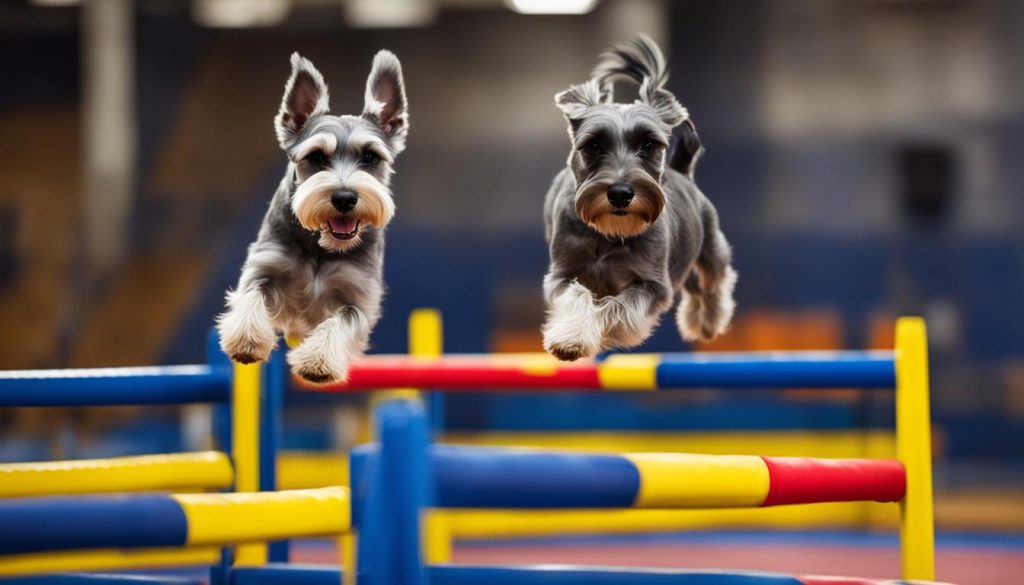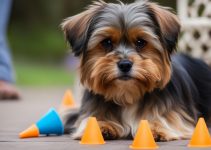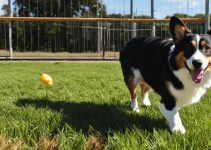Welcome to the world of Miniature Schnauzer training! As a proud owner of this intelligent and lively breed, I understand the importance of proper training to ensure their well-being and happiness. Miniature Schnauzers are highly trainable dogs who thrive on positive reinforcement and love to learn. In this article, I will share valuable tips and techniques to help you successfully train your Miniature Schnauzer, from puppyhood to adulthood.
Key Miniature Schnauzer Training Tips
- Start training early to establish good behavior habits and strengthen the bond with your Miniature Schnauzer.
- Use reward-based training methods to motivate and engage your dog in the learning process.
- Be calm, consistent, and authoritative during training sessions to establish trust and leadership.
- Challenge your Miniature Schnauzer’s intelligence and energy with advanced training techniques.
- Patience, persistence, and consistency are key to successful training and lifelong obedience.
Embracing Your Miniature Schnauzer’s Eagerness to Learn
Miniature Schnauzers are known for their high energy and intelligence, which makes them excellent candidates for training. Understanding these traits is crucial to successfully train your Miniature Schnauzer.
Understanding the Miniature Schnauzer’s High Energy and Intelligence
Miniature Schnauzers are lively and energetic dogs that require ample physical and mental stimulation. Their intelligence allows them to quickly grasp commands and learn new behaviors, making them highly responsive to training.
The Importance of Early Training to Channel Their Enthusiasm
Early training is essential for Miniature Schnauzers to channel their enthusiasm into positive behaviors. Starting training at a young age helps establish good behavior habits and prevents potential behavioral issues from developing.
Developing a Positive Learning Environment Through Reward-Based Training
Creating a positive learning environment is vital for effective Miniature Schnauzer training. Reward-based training methods, such as using treats, toys, or praise, motivate and reinforce desired behaviors. This positive approach fosters a harmonious bond between you and your Miniature Schnauzer.
Positive Reinforcement Training: The Key to Miniature Schnauzer Education
When it comes to Miniature Schnauzer training, positive reinforcement is the secret to success. This highly effective method involves rewarding desired behaviors with treats, toys, or praise to encourage their repetition.
Positive reinforcement creates a positive association with training, making it an enjoyable experience for both the owner and the dog. By focusing on rewarding and reinforcing desired actions, we can shape the behavior of our Miniature Schnauzers in a way that is efficient and humane.
With positive reinforcement training, we build a strong bond and trust between ourselves and our Miniature Schnauzer. The dog learns to associate good behavior with rewards, which motivates them to continue behaving desirably.
This training approach is especially beneficial for the Miniature Schnauzer breed, as they are known for their intelligence and eagerness to please. By using positive reinforcement, we tap into their natural desire to learn and please, making the training process more effective and enjoyable.
Remember, the key to successful Miniature Schnauzer training lies in positive reinforcement. By rewarding desired behaviors, we can shape their behavior, strengthen our bond with them, and help them reach their full potential.
Mastering the Tone and Delivery of Commands
In Miniature Schnauzer training, the tone and delivery of commands are essential for effective communication with your dog. It’s crucial to strike the right balance between assertiveness and aggression when giving commands. The key is to use a calm and authoritative voice, conveying your leadership and confidence.
Assertiveness Over Aggression: Finding the Right Voice
Being assertive in your tone demonstrates to your Miniature Schnauzer that you’re in control and establishes your position of authority. However, it’s important to avoid aggression or shouting, as this can intimidate and discourage your dog. Maintaining a firm but calm voice helps to command respect while fostering a positive training environment.
How to Use Your Miniature Schnauzer’s Name Effectively in Training
Using your Miniature Schnauzer’s name effectively in training can enhance their response to commands. By consistently associating their name with positive experiences and rewards, you create a strong connection between their name and the desired behavior. Use their name before giving a command to grab their attention and reinforce their focus on you.
Turning Miniature Schnauzer Training into a Joyful Partnership
Training sessions with your Miniature Schnauzer should be a joyful partnership between you and your furry friend. Approaching training with a positive and enthusiastic mindset sets the stage for success. By incorporating play and using positive reinforcement techniques, you create a joyful environment that strengthens the bond between you and your dog.
Positive reinforcement training is at the core of this joyful partnership. It involves rewarding desired behaviors using treats, toys, or praise. This approach not only helps your Miniature Schnauzer learn faster but also makes the training process enjoyable for both of you.

During training sessions, remember to have fun and engage with your Miniature Schnauzer. Take breaks for playtime or let them show off their tricks. This interactive and lighthearted approach keeps the training sessions enjoyable and rewarding for your dog.
By fostering a joyful partnership through positive reinforcement training, you can create a strong and loving bond with your Miniature Schnauzer. Enjoying the training process together not only ensures effective training but also enhances the overall relationship you share.
Addressing Misbehavior: The Art of Subtle Correction
When it comes to Miniature Schnauzer training, correcting misbehavior requires a subtle approach. Rather than resorting to harsh methods, it’s important to find the right balance between correction and encouragement. Here are some key strategies to address unwanted behaviors effectively:
Ignoring Unwanted Behaviors to Discourage Repetition
One common technique to discourage unwanted behaviors is to ignore them. By withholding attention and not rewarding the behavior, you send a clear message that the behavior is undesirable. For example, if your Miniature Schnauzer jumps up on people, avoid making eye contact, speaking to them, or giving any form of attention until they have all four paws on the ground. This helps to break the association between the behavior and the reward of attention.
Avoiding Over-Attention and Confusion During Correction
While it’s essential to address misbehavior, it’s equally important to avoid over-attention and confusion during the correction process. Over-attention can inadvertently reinforce the behavior, as your Miniature Schnauzer may interpret it as positive reinforcement. Instead, remain calm and composed while correcting the behavior, using your body language and tone of voice to convey your disapproval. Be consistent in your response to the misbehavior, so your dog can understand what is expected of them.
Consistency and clear communication are key to addressing misbehavior effectively. By employing subtle correction techniques and reinforcing desired behaviors, you can help your Miniature Schnauzer become a well-behaved and obedient canine companion.
Advanced Miniature Schnauzer Training Techniques for the Ambitious Pup
For ambitious Miniature Schnauzer owners, advanced training techniques can take their dog’s training to the next level. In addition to basic obedience training, incorporating agility and trick training can provide mental stimulation and keep your Miniature Schnauzer engaged and excited about learning.
Beyond Basic Obedience: Introducing Agility and Trick Training
Agility training is a thrilling way to challenge your Miniature Schnauzer’s physical and mental abilities. It involves navigating through obstacle courses, such as jumps, tunnels, and weave poles. Not only does agility training improve your dog’s coordination and athleticism, but it also strengthens the bond between you and your furry companion.

Trick training, on the other hand, allows you to showcase your Miniature Schnauzer’s intelligence and creativity. Teach them fun and impressive tricks like “roll over,” “play dead,” or “fetch a specific object.” Trick training not only stimulates your dog’s mind but also enhances their problem-solving skills.
Keeping Your Miniature Schnauzer Mentally Stimulated and Engaged
Aside from agility and trick training, there are various ways to provide mental stimulation for your Miniature Schnauzer. Puzzle toys, interactive games, and scent training are all excellent options. These activities keep your dog’s mind sharp and prevent boredom, which can often lead to destructive behavior.
Rotate your training sessions and activities to keep things exciting and ensure your Miniature Schnauzer remains engaged. Consider enrolling in advanced training classes or joining local dog sports clubs to further enhance your training journey.
By incorporating advanced training techniques, you can tap into your Miniature Schnauzer’s full potential and foster their overall well-being. Challenge their intelligence, provide mental stimulation, and watch them thrive as they master new skills.
Conclusion
In conclusion, successful Miniature Schnauzer training requires persistence and consistency. It is important to understand that training takes time and patience. By consistently working with your Miniature Schnauzer and using positive reinforcement techniques, you can achieve the desired results.
Establishing trust and leadership is a crucial aspect of training your Miniature Schnauzer. Building a strong bond with your dog and being a confident leader will contribute to their lifelong obedience. With trust and leadership, you can guide your Miniature Schnauzer towards good behavior and strengthen your relationship.
Remember that training is an ongoing process. Reinforce good behavior and continue to practice the commands and techniques you have learned. By remaining persistent and consistent in your training efforts, you can help your Miniature Schnauzer become a well-behaved and obedient companion for life.
FAQ
When should I start training my Miniature Schnauzer?
It’s recommended to start training your Miniature Schnauzer as early as possible, preferably when they are puppies. Early training helps establish good behavior habits and strengthens the bond between you and your dog.
What is the most effective training method for a Miniature Schnauzer?
Positive reinforcement training is the most effective method for educating a Miniature Schnauzer. This approach involves rewarding desired behaviors with treats, toys, or praise to encourage their repetition.
How should I deliver commands during training?
It’s important to be assertive and confident when delivering commands to your Miniature Schnauzer. Use a calm and authoritative tone to communicate clearly and effectively.
Should I incorporate play into training sessions?
Yes! Incorporating play into training sessions can make them more enjoyable and engaging for your Miniature Schnauzer. Play helps create a positive learning environment and strengthens the bond between you and your dog.
How do I correct misbehavior in my Miniature Schnauzer?
Correcting misbehavior in Miniature Schnauzers requires a subtle approach. Ignoring unwanted behaviors can discourage their repetition, while over-attention and confusion should be avoided during correction. Consistency and clear communication are key.
Can I teach my Miniature Schnauzer advanced training techniques?
Yes! Miniature Schnauzers are highly intelligent and energetic dogs, making them perfect candidates for advanced training techniques such as agility and trick training. These activities provide mental stimulation and keep your Miniature Schnauzer engaged and excited about training.
How long does it take to train a Miniature Schnauzer?
Training a Miniature Schnauzer takes time and patience. It is an ongoing process that should be consistent and persistent. Establishing trust and leadership through positive reinforcement and consistent training is key to lifelong obedience.






